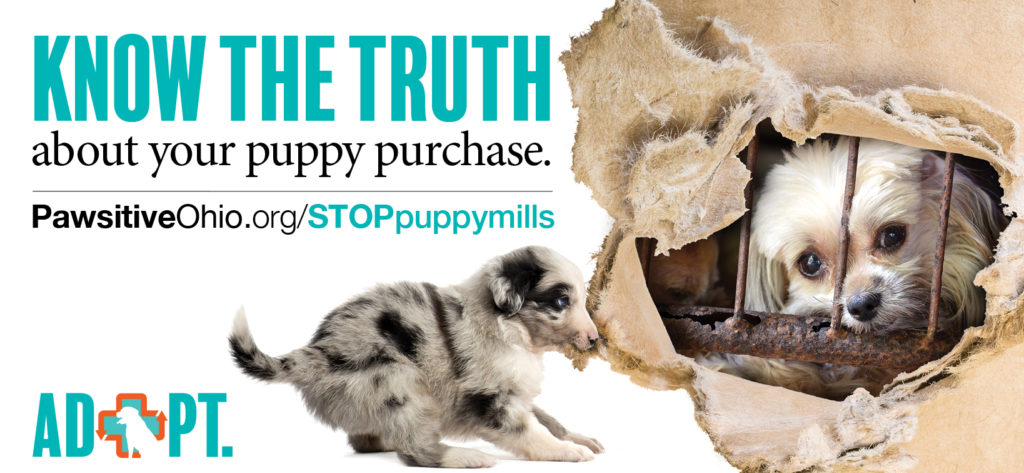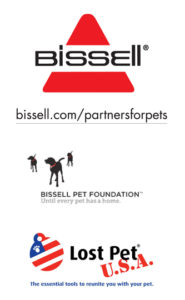At Pawsitive Ohio, we believe that dogs are members or our family but too many dogs in America don’t know this kind of love. Sadly, Ohio is an infamous puppy mill state and is home to hundreds of commercial breeding facilities. Victims of the high-volume puppy industry, they’re bred for profit and kept in tiny, filthy cages. These dogs don’t receive any affection, exercise or proper veterinary care. And when they can no longer produce puppies, they are discarded like trash—either dumped or killed. This shady industry uses many techniques to market its adorable “products” and it’s far time we shed some light on these inhumane businesses.

How Puppy Mill Breeding Hurts Dogs
(The ASPCA®-Barred from Love, Puppy Mills 101)
There’s a reason the puppy mill industry doesn’t show you where their puppies come from. To turn a profit, corners need to be cut, and it’s the dogs imprisoned in puppy mills who pay the price both physically and emotionally.
Puppies born into this sad world are comparatively lucky in one way: because they need to be sold while they’re small and young, the time they spend in these facilities is brief. Unfortunately, the effects of where and how they were bred last a lifetime. Poor genetics, early weaning, unsanitary environments and significant stress can contribute to the development of serious health and behavioral problems that are expensive, difficult or impossible to treat.
Constant Fear and Stress
Lack of normal human interaction hurts typically social animals like dogs. Dogs kept in commercial breeding facilities may pace back and forth in their “cages” bark nonstop, cower or appear entirely shut down. Since puppy mills only plan on selling puppies, there is little incentive to provide much physical or emotional care to the adult breeding dogs.
Set Up for Failure
Breeders want to produce as many puppies as possible as quickly as possible. Unlike responsible breeders, they don’t screen for inheritable disorders and remove dogs from their breeding program who are less likely to produce healthy puppies. Even psychological issues like anxiety and fearfulness can have genetic roots. And it only makes sense that, just like with humans, an unborn baby might be affected by a mother’s stress: Stressful puppy mill conditions that hurt mom, which include being bred constantly without any rest time, can potentially also harm her puppies.
Sudden Separation
The first months of puppies’ lives are a critical socialization period. Spending that time with their mother and littermates, along with slow weaning, helps prevent problems like extreme shyness, aggression, fear and anxiety. But puppies born in puppy mills are usually removed abruptly from their littermates and mothers at very early ages. This can cause underdevelopment and long-lasting emotional and behavior problems.
Here are a few ways that you can help Pawsitive Ohio put an end to puppy mills.
ADOPT don’t shop! It’s all about supply and demand. If you do not buy your puppy from a backyard breeder, or a pet shop (where puppy-mill puppies are sold), puppy mills will go out of business.
Speak out! Tell you friends, family and social networks about the dangers of puppy mills. Education is the best solution for most any wrong.
Support organizations that are working the end puppy mills and backyard breeders, support legislation against puppy mill or advocate for the rights of these animals. This can either be with your time —volunteering for local animal shelters, rescue groups, supporting spay/neuter programs — donations, or talents such as writing letters, organizing events and education. Below are a short list of some of the many worthwhile organizations working to stop puppy mills:
- American Society for the Prevention of Cruelty to Animals (ASPCA)
- Animal Legal Defense Fund
- Best Friends Animal Soicety
- Harley’s Dream
- Stop Puppy Mills Ohio
- The Puppy Mill Project
Write to your state and federal legislators. Tell them you are disturbed by the unethical breeding practices and inhumane treatment of dogs kept in puppy mills. Use your position as a voter to insist on legislation that ensures that dogs – and all animals – be born and raised in healthy environments.



